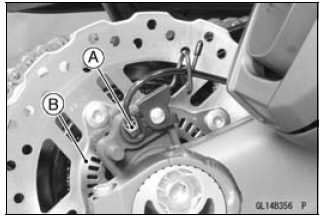 Kawasaki Z1000SX - Service manual > Parts Location
Kawasaki Z1000SX - Service manual > Parts Location
Front Wheel Rotation Sensor [A]
Front Wheel Rotation Sensor Rotor [B]

Rear Wheel Rotation Sensor [A]
Rear Wheel Rotation Sensor Rotor [B]

ABS Indicator Light [A]

ABS Hydraulic Unit [A]

Fuse Box 1 [A] (ABS Fuses and Accessory Fuse)

ABS Kawasaki Diagnostic System Connector [A]
ABS Self-diagnosis Terminal [B]

ABS System Wiring Diagram

- ABS Self-diagnosis Terminal
- Fuse Box 1
- ABS Motor Relay Fuse 30 A
- ABS Solenoid Valve Relay Fuse 20 A
- ABS ECU Fuse 10 A
- Fuse Box 2
- Ignition Fuse 10 A
- Front Brake Light Switch
- Meter Ground
- Frame Ground
- Water-proof Joint C
- Rear Brake Light Switch
- Battery 12 V 8 Ah
- Starter Relay
- Main Fuse 30 A
- Water-proof Joint D
- Meter Unit
- ABS Indicator Light (LED)
- Ignition Switch
- ABS Hydraulic Unit
- ABS Kawasaki Self-diagnosis System Connector
- Front Wheel Rotation Sensor
- Rear Wheel Rotation Sensor
Color Codes:
BK: Black
BL: Blue
BR: Brown
CH: Chocolate
DG: Dark Green
G: Green
GY: Gray
LB: Light Blue
LG: Light Green
O: Orange
P: Pink
PU: Purple
R: Red
V: Violet
W: White
Y: Yellow
ABS Hydraulic Unit Terminal Names

- Power Supply to ABS Motor
- Power Supply to ABS Solenoid Valve Relay
- Ground
- Ground
- ABS Self-diagnosis Terminal
- Unused
- Unused
- Front and Rear Brake Light Switch
- Unused
- Unused
- Unused
- Unused
- Unused
- Unused
- Unused
- Power Supply
- Unused
- Unused
- Unused
- Unused
- Unused
- Unused
- Power Supply to Front Wheel Rotation Sensor
- ABS Kawasaki Self-diagnosis System Terminal
- ABS Indicator Light (LED)
- Power Supply to Rear Wheel Rotation Sensor
- Front Wheel Rotation Sensor Signal
- Unused
- Unused
- Rear Wheel Rotation Sensor Signal
- Unused
- Unused
See also:
 Kawasaki Z1000SX - Service manual > ABS Servicing Precautions, ABS Troubleshooting Outline
Kawasaki Z1000SX - Service manual > ABS Servicing Precautions, ABS Troubleshooting Outline
ABS Servicing Precautions There are a number of important precautions that should be followed servicing the ABS system. This ABS system is designed to be used with a 12 V sealed battery as its power source. Do not use any other battery except for a 12 V sealed battery as a power source. Do not reverse the battery cable connections. This will damage the ABS hydraulic unit. To prevent damage to the ABS parts, do not disconnect the battery cables or any other electrical connections when the ignition switch is ON or while the engine is running. Take care not to short the leads that are directly connected to the battery positive (+) terminal to the chassis ground. Do not turn the ignition switch ON while any of the ABS electrical connectors are disconnected. The ABS hydraulic unit memorizes service codes. Do not spray water on the electrical parts, ABS parts, connectors, leads and wiring. If a transceiver is installed on the motorcycle, make sure that the operation of the ABS system is not influenced by electric wave radiated from the antenna. Locate the antenna as far as possible away from the ABS hydraulic unit. Whenever the ABS electrical connections are to be disconnected, first turn off the ignition switch. The ABS parts should never be struck sharply, as with a hammer, or allowed to fall on a hard surface. Such a shock to the parts can damage them. The ABS parts cannot be disassembled. Even if a fault is found, do not try to disassemble and repair the ABS parts, replace it. The ABS has many brake lines, pipes, and leads. And the ABS cannot detect problems with the conventional braking system (brake disc wear, unevenly worn brake pad, and other mechanical faults). To prevent trouble, check the brake lines and pipes for correct routing and connection, the wiring for correct routing, and the brakes for proper braking power. Be sure to check for fluid leakage, and bleed the brake line thoroughly.
 Rider's Manual BMW R 1250 GS GSA
Rider's Manual BMW R 1250 GS GSA Owner's Manual Harley-Davidson Sportster XL1200X Forty-Eight
Owner's Manual Harley-Davidson Sportster XL1200X Forty-Eight Owner's Manual Honda CBR650R
Owner's Manual Honda CBR650R Service manual Honda CBR650
Service manual Honda CBR650 Owner's Manual Honda PCX125
Owner's Manual Honda PCX125 Owner's Manual Kawasaki Z1000SX
Owner's Manual Kawasaki Z1000SX Service manual Kawasaki Z1000SX
Service manual Kawasaki Z1000SX Owner's Manual Lexmoto Echo
Owner's Manual Lexmoto Echo Owner's Manual Royal Enfield Interceptor 650
Owner's Manual Royal Enfield Interceptor 650 Service manual Royal Enfield Interceptor 650
Service manual Royal Enfield Interceptor 650 Owner's Manual Yamaha MT-07
Owner's Manual Yamaha MT-07